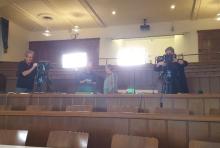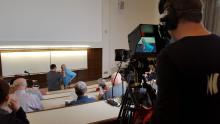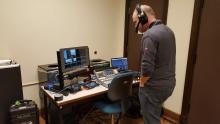Television crews have been rolling onto campus the last couple of weeks, but they're not chasing the latest celebrity sighting. Instead they have set their sights on capturing some of the best history lectures in America, and the award-winning faculty members of the UW Department of History are up to the challenge.
American History TV (AHTV) is a service which broadcasts on CSPAN-3 every weekend. Among its many televised offerings are pre-recorded university lectures from some of the nation's leading historians. Professor Emeritus Quintard Taylor was chosen for this honor in 2012. This year he is joined by department members Margaret O'Mara and William Rorabaugh. Rorabaugh's lecture, "Counterculture: Beats and Beatniks" was recorded on February 9, and O'Mara's "1968: The Fracturing of America" on February 15.
AHTV's "Lectures in History" series records over forty college lectures annually. The producers seek recommendations for dynamic speakers from a variety of sources?in many cases other professors. After vetting potential candidates and sounding their interest, AHTV gives them the opportunity to select one of their own favorite lectures to record. "Often our speakers choose a topic related to the scholarship they are known for," notes series producer Russell Logan, "but sometimes they showcase a subject they are personally passionate about, but rarely have the opportunity to present in public venues." Logan adds that it was just coincidence that the network selected both professors Rorabaugh and O'Mara for its roster this quarter?though it certainly reflects well on the department's commitment to excellence in undergraduate education.
Recording a lecture in the midst of a standard college course can pose challenges. Teams deploy up to three cameras, and do most of the direction and production onsite. "Real classrooms are not necessarily set up for TV crews," Logan observes. "Within a couple of hours the teams have to create a studio on the fly, and on every campus they encounter different physical layouts, restrictions, and multimedia requirements." Still the UW taping went off without a hitch. The film crew had to arrive at UW before classes commenced each day to set up their equipment, and then hang around to keep an eye on things until the lecture began.
Asked why the C-SPAN cable network?which is known for covering American politics and governance in the present-day?maintains a service dedicated to the nation's history, Logan said that the connection is obvious. "You really just need to turn on the TV and listen to the things being said during campaigns, or in speeches on the floor of Congress, to see the need for an understanding of the policies, people and eras of the past. It is common to think that the debates of the moment are new, but when you look back, you find that the same themes tend crop up again and again?for example, taxes, health care, Social Security, or government growth. That awareness can add an important level of breadth and depth to the way we interpret current events."
Department of History Chair Anand Yang shares in those sentiments. According to Yang, the department is always looking for new ways to bring both the lessons and the sheer enjoyment of history to new audiences. "In the digital age, more than ever, we historians are working to innovate, both in our teaching and in our research. By exploring new approaches, we seek not to replace traditional lectures and texts, but to augment them, making them more productive and accessible. AHTV represented a great opportunity for the department to do exactly that."
As for Professors O'Mara and Rorabaugh, recording a favorite lecture in an actual teaching context offered a win-win situation. "I appreciate the opportunity to bring the things I teach here at UW to a national television audience," said O'Mara, "but what attracted me even more was the chance to increase my students' awareness of the broader relevance of the history they are learning here, to their lives outside the classroom."
Broadcast dates for the lectures taped at UW in February are still to be determined, but you can expect to see them premier on CSPAN-3 in the next few months. New lectures normally debut on Saturdays at 8 PM and midnight ET. Lectures are also subsequently available online here, as podcasts, and in subsequent rebroadcasts.


